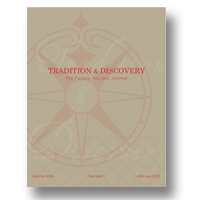|
journal and society information |
|
1.
|
Tradition and Discovery: The Polanyi Society Periodical:
Volume >
43 >
Issue: 2
Editorial Board and Submissions Guide
view |
rights & permissions
| cited by
|
|
|
|
|
|
|
2.
|
Tradition and Discovery: The Polanyi Society Periodical:
Volume >
43 >
Issue: 2
Paul Lewis
Preface
view |
rights & permissions
| cited by
|
|
|
|
|
journal and society information |
|
3.
|
Tradition and Discovery: The Polanyi Society Periodical:
Volume >
43 >
Issue: 2
Notes on Contributors
view |
rights & permissions
| cited by
|
|
|
|
|
essays |
|
4.
|
Tradition and Discovery: The Polanyi Society Periodical:
Volume >
43 >
Issue: 2
Thomas Pfau
The Failure of Charity and the Loss of Personhood:
Beyond the Enlightenment Impasse
abstract |
view |
rights & permissions
| cited by
Pfau elaborates the arguments he develops in Minding the Modern, and devotes particular attention to the question of the incommensurability of premodern and modern accounts of personhood and agency. He highlights the distinct nature of humanistic forms of inquiry (including history and theology) and examines their hermeneutic character, noting the priority of meaning over method. He emphasizes the interdependence of affection, volition, and cognition, and also analyzes varying descriptions of relationality. The article closes with a meditation on a section of T.S. Eliot’s Waste Land and the insights it provides to the themes mentioned in the essay.
|
|
|
|
|
5.
|
Tradition and Discovery: The Polanyi Society Periodical:
Volume >
43 >
Issue: 2
Martin X. Moleski
Restoring Faith in Reason:
Thomas Pfau’s Defense of Humanistic Inquiry
abstract |
view |
rights & permissions
| cited by
This article provides an appreciative but critical analysis of the account of humanistic inquiry Thomas Pfau develops in Minding the Modern. Moleski examines various complementary accounts of tacit knowing, and highlights the importance of assent, conscience, and tradition. He critiques Pfau’s account of objectivity, and argues perspectivalism and pluralism are not barriers to reliable knowledge of reality. He concludes with a cursory comparison of the efforts of Pfau, Newman, Polanyi, and Lonergan.
|
|
|
|
|
6.
|
Tradition and Discovery: The Polanyi Society Periodical:
Volume >
43 >
Issue: 2
Philip Rolnick
Person and Its Constellated Corollaries:
Conversing with Thomas Pfau
abstract |
view |
rights & permissions
| cited by
This essay explores the analysis of the concept of the person Thomas Pfau develops in Minding the Modern. Rolnick highlights the correspondence of the concepts of personhood and incommunicability, and also examines the relationship between personhood, intellect, and will. He further analyzes the correspondence between personhood, transcendence, and grace. He concludes with a question about Pfau’s reading of the history of modernity and the difference between formal and informal historical influences.
|
|
|
|
|
7.
|
Tradition and Discovery: The Polanyi Society Periodical:
Volume >
43 >
Issue: 2
Martin E. Turkis II
Robert Scholes:
A Philosophically-Grounded Approach to English Pedagogy as Popular, Post-Critical Education
abstract |
view |
rights & permissions
| cited by
Robert Scholes is a respected literary critic and semiotician who, motivated by dissatisfaction with the reigning epistemological assumptions in the field of literary theory, has advocated revamping the discipline of English in significant ways. Scholes’s own epistemology and semiotic approach to pedagogy cohere quite well with Polanyi’s epistemological work and are, in essence, post-critical. Given that far more students in the American educational system study English than philosophy, a wider embrace of Scholes’s pedagogical approach could provide more opportunities than are currently available to give students access to a post-critical formation. Scholes’s epistemology, semiotics, and pedagogy are discussed in some detail, and resonances with Polanyi’s grand project are highlighted.
|
|
|
|
|
book review |
|
8.
|
Tradition and Discovery: The Polanyi Society Periodical:
Volume >
43 >
Issue: 2
Andrew Grosso
The Extended Self: Architecture, Memes, and Minds
view |
rights & permissions
| cited by
|
|
|
|





